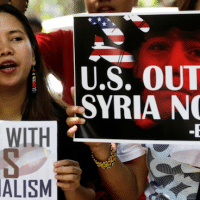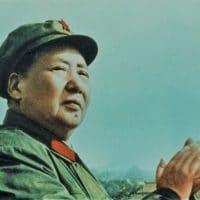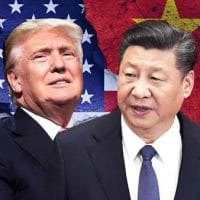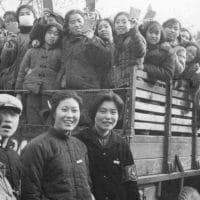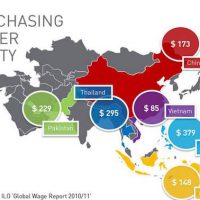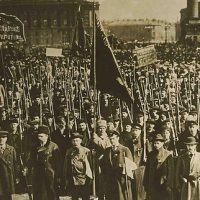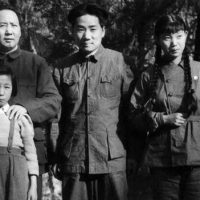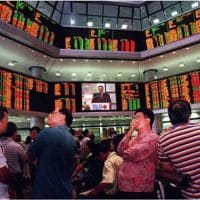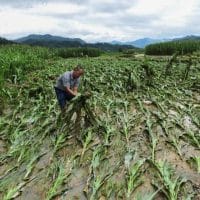-
Brzezinski’s ghost shapes Washington Eurasia geopolitics
Contrary to a widely-held belief that U.S. President Trump acts only out of impulse or is being unpredictable, I believe that the opposite is the case.
-
China’s determined march towards the ecological civilization
There is no time for long introductions. The world is, possibly heading for yet another catastrophe. This one, if we, human beings will not manage to prevent it, could become our final.
-
There is a structural crisis of capitalism
In this in-depth interview conducted in Dakar, Samir Amin speaks on a wide range of topics: globalisation; generalised monopoly capital; the alarming growth of inequality; the role of the state in the neoliberal era; globalisation and delinking; capitalism and modernity; the return of fascism in the contemporary capitalist world, and more.
-
China slams U.S. human rights record in devastating report
THE U.S. has been accused of human rights abuses, serious infringements of its citizens’ rights and “systematic racial discrimination” in a damning report released by China.
-
Mao’s legacy defended, and famous swim decoded, for clueless academics
In late 1965 the rumblings of the Cultural Revolution had begun, due to grumblings over corruption, revisionism (“taking the capitalist road,” selling out socialism, etc.) and the snooty technocratism of urbanites. The party, led by Mao, saw these trends as threats to the common good, the revolution, and the Party’s “Heavenly Mandate” – the millennia-old concept that China’s rulers are chosen by Heaven to rule, and that they must actually display this divinity via perfectly moral conduct and leadership…or else revolt is justified.
-
What’s driving trade tensions between the U.S. and China
There is a lot of concern over the possibility of a trade war between China and the US. In early April President Trump announced that his administration was considering levying $100 billion of additional tariffs on Chinese exports, after the Chinese government responded to a previously proposed U.S. tariff hike on Chinese goods of $50 billion by announcing its own equivalent tariff hikes on U.S. exports. And the Chinese government has made clear it will again respond in kind if these new tariffs are actually imposed.
-
China’s rise threatens U.S. imperialism, not American people
That China and the U.S. are moving in opposite directions is not a new trend, but it has been brought into sharper focus in the Trump era. Growing anxious about its diminishing international authority, the U.S. demonstrates increasing hostility towards China.
-
What does China’s ‘ecological civilization’ mean for humanity’s future?
Imagine a newly elected president of the United States calling in his inaugural speech for an “ecological civilization” that ensures “harmony between human and nature.” Now imagine he goes on to declare that “we, as human beings, must respect nature, follow its ways, and protect it” and that his administration will “encourage simple, moderate, green, and low-carbon ways of life, and oppose extravagance and excessive consumption.”
-
The struggle for actually building socialist society
“The economic base built in Mao’s era laid the foundation for a sovereign capitalist development.”
-
Do Purchasing Power Parity exchange rates mislead on incomes? The case of China
Ever since Larry Summers and Alan Heston produced what become known as the “Penn World Tables” comparing prices and thereby the purchasing power of currencies across countries, the urge to use some deflator of market exchange rates to compare incomes across countries has been strong.
-
The Bolshevik Revolution and the legacy of anti-imperialism
For those of us dedicated to revolutionary politics, taking control of this history is a crucial step towards building of international solidarity in the fightback against capitalist globalization and emergent neofascism, which is rearing its ugly head across the globe.
-
Mao reconsidered
“The simple facts of Mao’s career seem incredible.… Indeed Mao’s achievement is almost beyond our comprehension.” – John King Fairbank, The United States and China.
-
Twenty years after the Asian financial crisis
The hegemony of international finance capital, which led to economies “opening” themselves up to the vortex of global financial flows, demolished both Nehruvian dirigisme and East Asian neo-mercantilism. And the same hegemony has now brought the world capitalist economy to a crisis from which it is in no position to recover.
-
Maize, rice, wheat: alarm at rising climate risk to vital crops
No one likes to think about how extreme weather events could devastate food production which could cause global panic and disaster. However, scientists, led by Chris Kent, of the Met Office, focused their initial efforts on how extreme weather would affect maize, one of the world’s most widely grown crops. Along with maize other staple crops could be affected including those of rice, wheat and soya beans.
-
Marxism, Ecological Civilization, and China
China’s leadership has called in recent years for the creation of a new “ecological civilization.” Some have viewed this as a departure from Marxism and a concession to Western-style “ecological modernization.” However, embedded in classical Marxism, as represented by the work of Karl Marx and Frederick Engels, was a powerful ecological critique. Marx explicitly defined […]
-
Marines in Darwin: US Energy Imperialism and the South China Sea
During Barack Obama’s visit to Australia in November 2011, the US and Australian governments announced the establishment of a permanent Marine presence in Darwin, located on South East Asia’s doorstep. By 2014, some 2, 500 Marines plus associated hardware such as military aircraft, tanks, artillery, and amphibious assault vehicles will be based near the […]
-
The Dragon’s Shadow: China’s Banking System
On October 10, the Chinese government announced that it will increase its stakes in the four largest commercial banks, which are already largely public-owned. The move is designed to “support the healthy operations and development of key state-owned financial institutions and stabilise the share prices of state-owned commercial banks”. But why was this move considered […]
-
U.S. Sanctions and China’s Iran Policy
The Financial Times reports that Iran and China are “in talks about using a barter system to exchange Iranian oil for Chinese goods and services, as U.S. financial sanctions have blocked China from paying at least $20 billion for oil imports.” According to the story, Tehran and Beijing are now discussing how to “offset” the […]
-
Revisiting Alleged 30 Million Famine Deaths during China’s Great Leap
Thirty years ago, a highly successful vilification campaign was launched against Mao Zedong, saying that a massive famine in which 27 to 30 million people died in China took place during the Great Leap period, 1958 to 1961, which marked the formation of the people’s communes under his leadership. The main basis of this assertion […]
-
Russia and China on Syria
Moscow against UN Security Council Taking Up Syria — Source MOSCOW, May 11 (Interfax) — Moscow is against the Syria issue being put before the UN Security Council, a Russian Foreign Ministry source said on Wednesday. “Syria mustn’t be discussed in the Security Council, that is obvious,” the source told Interfax. China Calls on […]




